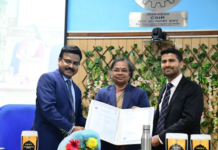
With the use of hybrid technology, the Gerresheimer plant in Lohr plans to build a glass melting furnace for white glass in 2022, saving significantly more CO2 than conventional technology. The company has submitted a funding application to the German Federal Ministry for the Environment for this pioneering innovative project according to the press release datelined Düsseldorf/Lohr, 13 September 2021.
With modern and sustainable glass production technology, Gerresheimer’s plants in Germany set exemplary standards for all of the company’s plants in Europe, America, and Asia, particularly in innovations for greater sustainability. “This pioneering technology project serves to strengthen Germany as an industrial and glass location. With this innovative technology, we will set new standards in terms of sustainability and avoidance of emissions,’ said Andreas Kohl. As Global senior vice president of Operations, Kohl is responsible for worldwide container glass production and its technical development in the Gerresheimer Group.
Gerresheimer produces more than one billion glass containers annually for the pharma and food industries with two melting furnaces for clear and amber glass at the Lohr plant. “By using this sustainable furnace technology in conjunction with green energy for the glass melting process, we will significantly reduce CO2 emissions in production by around 25,000 tons per year,” says Jörg Buchmayer, head of Production and Technology, who is responsible for the project. We are using hybrid technology, which makes it possible to cover half of the required melting energy in the furnace with green electricity and the other half with natural gas.
Glass can be recycled an infinite number of times. However, high temperatures are required for glass melting. This costs energy and generates corresponding CO2 emissions. For more than a decade, the Gerresheimer Group has been working on using no more energy than absolutely necessary for the sustainable production of its glass containers for the pharma, cosmetics, and food industries.
Gerresheimer also produces glass containers for numerous well-known branded products in the pharma and cosmetics world at its German sites in Essen and Tettau. As part of its global sustainability strategy, Gerresheimer has set itself the goal of reducing its CO2 emissions by 50% by 2030 compared with 2019. The resource-saving production of the glass plays a decisive role in this. The innovative technology planned for the plant in Lohr is pioneering in this respect.
Gerresheimer has 43 plants around the world in Europe, North and South America, and Asia. The Asian plants include five in China and six in India.
Gerresheimer in India
With its head office in Mumbai, Maharashtra, its six plants in India include two in Mumbai, three in Kosamba in Gujarat, and one in Kundli in the Delhi NCR. The Mumbai locations produce primary packaging molded and tubular glass. In addition, it delivers pharmaceutical packaging solutions with molded glass and tailor-made tubular glass from its two state-of-the-art facilities located in Kosamba, Gujarat.
Kosamba also has the capacity for primary packaging plastics. Gerresheimer’s plant in North India for primary plastics is in Kundli in the Delhi NCR. At this plant, it develops and manufactures solid and liquid bottles for ophthalmic and parenteral applications.
IndiFoodBev — authentic, impactful and influential
An English-language food and beverage processing and packaging industry B2B platform in print and web, IndiFoodBev is in its third year of publication. It is said that the Indian food and beverage industries represent approximately US$ 900 billion in revenues which implies more than 20% of the country’s GDP. Eliminating the wastage on the farmside can help to deliver more protein to a higher number of the population apart from generating sizable exports. The savings in soil, seeds, water, fertilizer, energy and ultimately food and nutrition could be the most immense contribution that country is poised to make to the moderation of climate change.
To improve your marketing and grow sales to the food and beverage processing and packaging industry, talk to us. Our research and consulting company IppStar [www.ippstar.org] can assess your potential and addressable markets in light of the competition. We can discuss marketing, communication, and sales strategies for market entry and growth.
Suppliers and service providers with a strategy and budget for targeted marketing can discuss using our hybrid print, web, video, and social media channels to create brand recognition linked to market relevance. Our technical writers are ready to meet you and your customers for content.
The second largest producer of fruit and vegetables in the world is continuously expanding processing capacities and delivery systems with appropriate innovative technologies. We cover product and consumer trends, nutrition, processing, research, equipment and packaging from farm to thali. Get our 2025 media kit and recalibrate your role in this dynamic market. Enhance your visibility and relevance to existing markets and turn potential customers into conversations. Ask for a sample copy of our bi-monthly in print or our weekly IndiFoodBev eZine each Wednesday.
For editorial info@ippgroup.in — for advertisement ads1@ippgroup.in and for subscriptions subscription@ippgroup.in
Naresh Khanna – 10 February 2025
Subscribe Now










